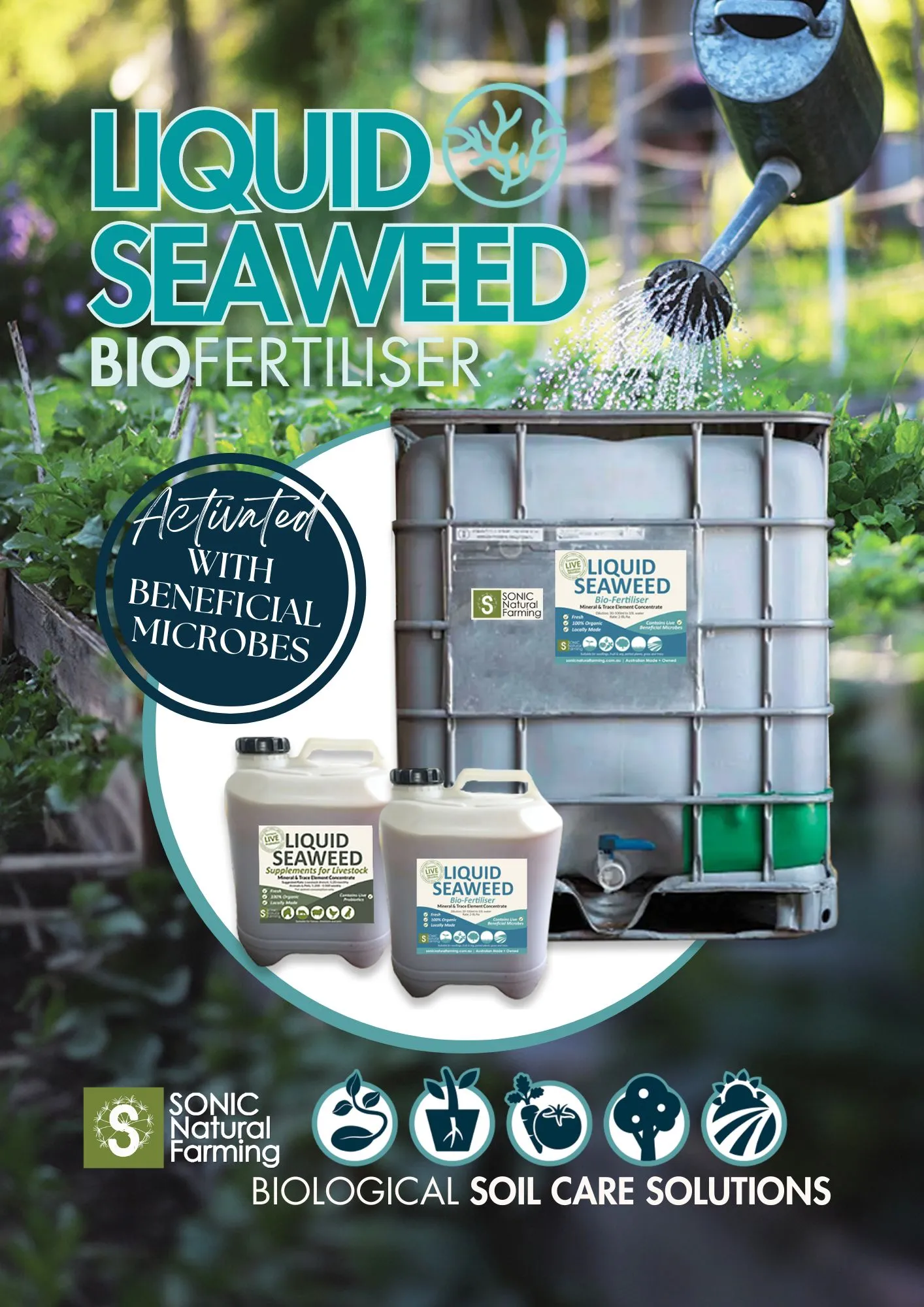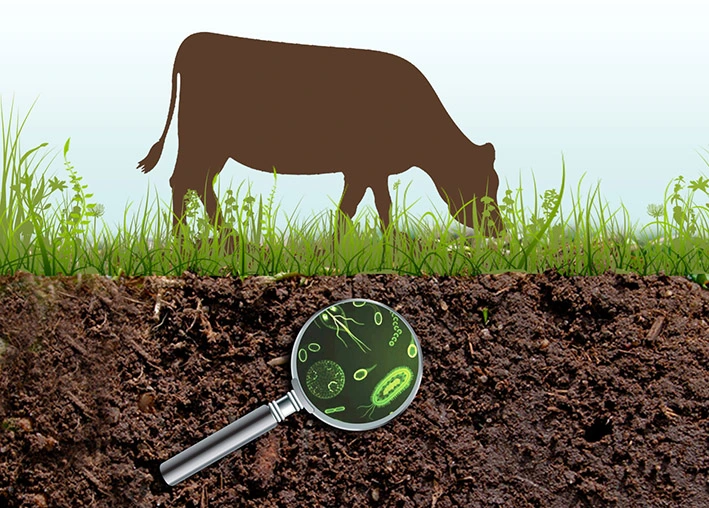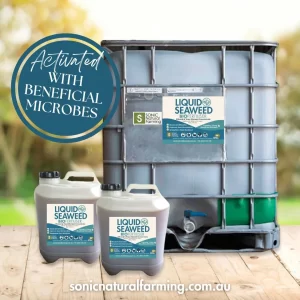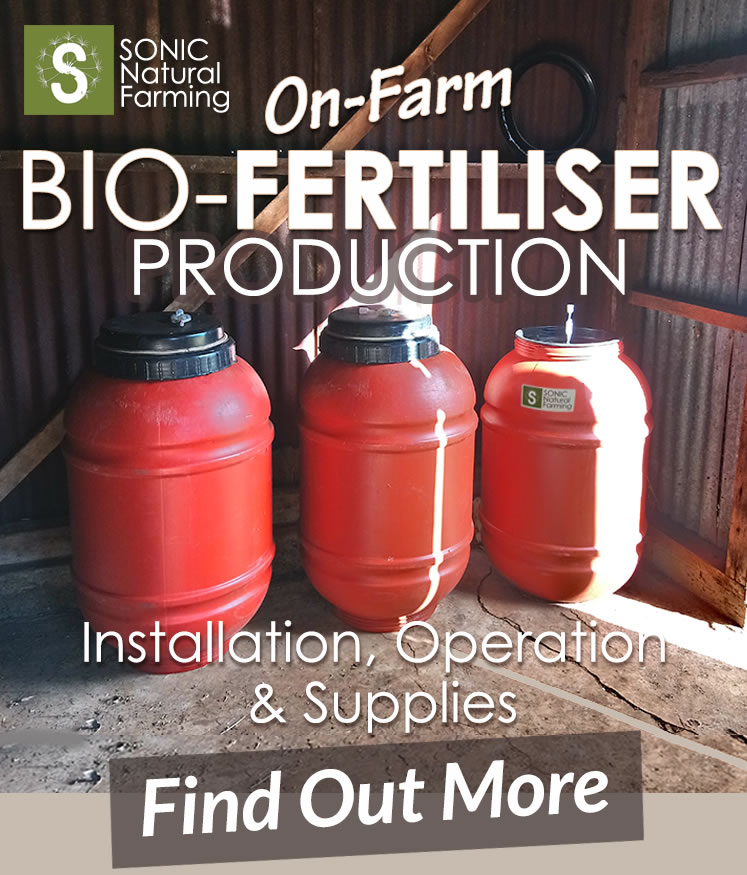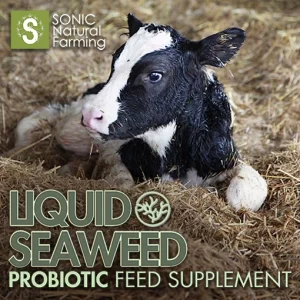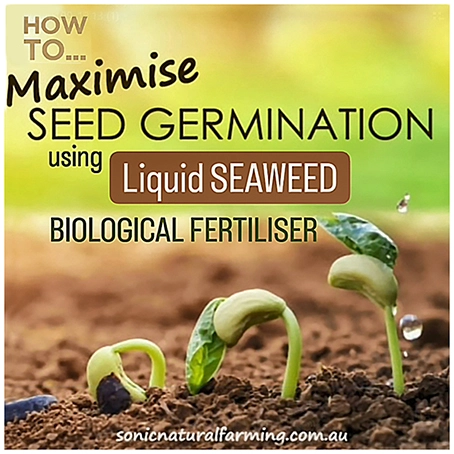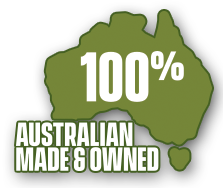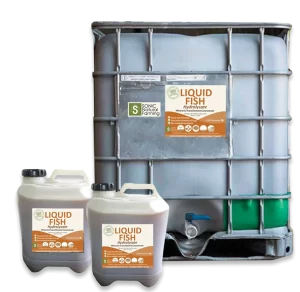About Biological Fertilisers
For farmers seeking real long-term soil health results, Liquid Fish and Seaweed Biological Fertilisers are a premium, soil care solution. Made through a biological fermentation process, these ocean-sourced mineral concentrates boost soil health and crop nutrition by introducing organic minerals AND beneficial microbes.
These microbial inoculants trigger microbial activity in the soil, breaking down organic matter and deliver nutrients in a plant-available form. Healthier plants, nourished by organic nutrition and beneficial microbes, lead to stronger more resilient crops, and more nutritious produce.
Supporting and feeding your soil’s biology builds a sustainable, productive foundation for long-term farm success
How is Biological Fertiliser Made?
SONIC Biological Fish and Seaweed Fertilisers are made using a cold fermentation process, which preserves the integrity of ocean fish and seaweed kelp ingredients, ensuring the final product is rich in organic nutrients and beneficial microbes.
The Production Process
Processing biological fertilisers involves cold fermentation using 100% natural microorganisms, including beneficial bacteria, fungi, and other microbes.
These microbial cultures break down the fish and seaweed ingredients, creating a bioavailable liquid mineral concentrate that enhances soil fertility and nurtures your soil, resulting in healthier crops and more resilient land for years to come.
Fermentation ‘Predigests’ Nutrients and makes them Easier for Plants, Soil Microbes, and Animals to Absorb
SONIC BOOM Microbial Cultures contain a diverse collection of indigenous microbes, carefully selected for its adaptability from a number of unique Australian locations including scrubland, pastures, pine forests, high-altitude regions, and nutrient-rich compost.
By sourcing from multiple locations, we ensure that the cultures are primed to produce premium biological fertilisers that are beneficial across a diversity of soil types and climates around Australia.
Unlock the Superpower of Soil Microbes and Populate Your Soil for Exceptional Health!
Microbial Starter Cultures are introduced at the start of the fermentation process to inoculate, activate, and maintain a healthy balance of beneficial microbes throughout the fermentation process.
By using a cold fermentation process, compounds are converted into a soluble form, preserving all minerals and trace elements in a naturally balanced, bio-available state. This allows for easy uptake and utilisation by animals, soil, and the roots and leaves of your crops.
How Do Biological Fertilisers Benefit Soil?
Fermentation is a process that has been utilised for centuries in various industries including the production of biological fertiliser, a soil amendment with both microbial fertiliser, and mineral fertiliser effects. Cold fermentation is the key to making biologically ‘alive’ fertilisers.
By using biologically active products we can harness the full potential of beneficial microorganisms, to achieve optimal results in plant growth, resilience, and agricultural productivity.
Benefits of Boosting Soil Microbes
- Enhanced nutrient cycling
- Improved plant immunity
- Fix atmospheric nitrogen
- Supports seed germination
- Increased nutrient brix levels and more
One of the Many Functions of Beneficial Microorganisms is Suppressing Harmful Pathogens and Pests
Biologically fermented Liquid Fish and Liquid Seaweed contain a range of naturally occurring microbes that can directly benefit soil health and, when applied, encourage the growth of these beneficial microbes in the soil. These microbes work in synergy with plants to improve nutrient availability, enhance disease resistance, and support soil biodiversity.
| Beneficial Microbe | Primary Function in the Soil |
|---|---|
| Lactic Acid Bacteria (LAB) | Enhances nutrient cycling, suppresses harmful pathogens, promotes breakdown of organic matter into plant-available forms. |
| Bacillus species | Enhances nutrient availability (especially phosphorus), breaks down organic matter, controls soilborne diseases. |
| Actinobacteria | Decomposes organic matter, especially complex materials like cellulose and lignin. Improves soil texture and nutrient availability. |
| Rhizobacteria | Fixes nitrogen, enhances nutrient uptake, produces growth-promoting hormones (e.g., auxins, cytokinins). |
| Pseudomonas species | Produces antimicrobial compounds, improves nutrient availability, suppresses harmful pathogens, breaks down organic matter. |
| Yeasts | Promotes fermentation of organic matter, produces beneficial byproducts like vitamins and enzymes that support plant growth. |
| Fungi (Mycorrhizal Fungi) | Forms symbiotic relationships with plant roots, enhances nutrient absorption (particularly phosphorus), increases plant disease resistance. |
Soil biology plays a crucial role in the availability and absorption of nutrients by plants. Here’s how it works:
- Microbial Activity
Soil microbes break down organic matter (like dead plant and animal material) into simpler forms of nutrients, making them accessible to plant roots. Without microbes, many of these nutrients would remain locked in organic forms and unavailable to plants. - Symbiotic Relationships
Certain microbes, such as mycorrhizal fungi, form symbiotic relationships with plant roots, enhancing the plant’s ability to absorb water and nutrients (especially phosphorus). In return, plants supply the fungi with carbohydrates. - Nutrient Cycling
Soil microbes are integral in the nutrient cycle. They help decompose organic material, release minerals and nutrients, and create healthy soil conditions, which directly influence which nutrients plants can absorb. - Nutrient Availability
The activity and diversity of soil organisms determine the types of nutrients that are available in the soil at any given time. For example, some microbes convert nitrogen in the air into forms that plants can use, while others make phosphorus more accessible. - Influence on Soil pH
Soil microbes can also affect the pH of the soil, which in turn affects nutrient availability. For instance, some microbes acidify the soil slightly, making certain minerals (like iron and manganese) more accessible to plants.
In summary, healthy soil biology is a key factor in nutrient availability, and plays a significant role in determining the nutrients plants absorb.

Delivering Organic Mineral Nutrition to your Soil, Seeds, Crops, and Livestock.

See What Farmers are Saying
GREAT RESULTS
If I see something once and something that dramatic, I know it’s got to be doing good.
RESILIENCE
I think it’s doing a fantastic job! We have had the best year with the most tree stress.
Why Use Biological Fertilisers?
Biological fertilisers optimise soil biology, enhancing nutrient cycling and availability for plants. By supporting diverse soil life, farmers can grow more nutritious crops and pastures. To boost soil health further, and achieve the best results, use biological fertilisers in conjunction with regenerative farming practices.
Biological Fertilisers encourage earthworms, fungi, bacteria and other beneficial organisms to thrive
Healthy, biologically active soils don’t just improve nutrition – they also enhance drought resilience, water infiltration, and soil structure for better overall growing conditions.
Improving soil biology is an investment in the long-term productivity and sustainability of your crops and pastures.
Is it time to give your soil what it deserves?
Biological Fertilisers FAQs
SONIC Liquid Fish and Seaweed Biofertilisers contain native microbial strains isolated from soils well-adapted to Australian conditions. These microbes enhance soil microbiology, support nutrient cycling, balance pH, and help remediate salt and chemical impacts. Fish and Seaweed Biofertilisers also deliver bioavailable organic minerals and trace elements essential for optimal crop growth.
Unlike NPK fertilisers, that just feed plants (synthetic) minerals, biological fertilisers work by delivering organic minerals and boosting the soil’s microbiome—improving nutrient cycling and plant immunity. This leads to stronger, healthier crops, without the potential of mineral imbalances or runoff that NPK fertilisers can cause.
| Feature | Natural Fertilisers (e.g., Fish Hydrolysate) | Synthetic Fertilisers (e.g., Urea) |
|---|---|---|
| Source | Derived from natural materials like fish byproducts, compost, or seaweed. | Manufactured from synthetic chemicals or mined minerals. |
| Nutrient Composition | Contains a broad spectrum of nutrients including NPK, amino acids, and trace minerals. | Primarily provides specific nutrients like NPK in concentrated forms. |
| Nutrient Release | Varies by application: Quick-release when used as a foliar spray (absorbed through leaves); slow-release when applied to soil, feeding plants over time via microbial activity. | Quick-release, providing immediate nutrients to plants but often lacking sustained availability. |
| Soil Health Impact | Enhances soil structure, increases microbial activity, and improves water retention. | Can degrade soil structure, reduce microbial life, and lead to long-term fertility decline. |
| Environmental Impact | Lower risk of runoff and pollution; supports sustainable practices. | Higher risk of leaching, runoff, and environmental harm. |
| Plant Growth | Supports balanced, resilient growth with improved flavour and nutrition; helps achieve higher nutrient density in crops. | May stimulate fast growth but can cause imbalances or fertiliser burn; does not support high nutrient density in plants. |
| Cost | Generally higher upfront cost; long-term savings through improved soil health and using DIY methods for production. | Lower cost; requires more frequent application, as land often becomes dependent on increasing amounts each year, raising costs over time. |
| Application Frequency | Initially applied more frequently to activate soil biology, then less often as natural ecosystems restore balance and fertility. | Frequent applications required to sustain growth; dependence increases over time, creating a perpetual input cycle. |
| Compatibility with Regenerative Practices | Highly compatible; supports biodiversity, carbon sequestration, and soil restoration. | Small amounts may offer a temporary boost, but over time, become unnecessary as regenerative practices and natural inputs rebuild the soil. |
Naturally fermented liquid products, begin working immediately by activating soil biology and delivering bio-available nutrition to plants. Results will vary depending on your crop, soil, and growing practices. For grazing pastures, in poor condition, improvements in soil biology may take a few years to fully develop. When seeding, you can often see faster seed germination and stronger early growth. Orchard and vegetable growers typically notice improved growth, flavour, nutrient-density, and a longer shelf life.
Liquid seaweed extracts are chemically-extracted or heat-extracted to concentrate specific minerals. These processes can result in the loss of some nutrients and trace elements. In contrast, Seaweed Biofertiliser, such as SONIC Liquid Seaweed, is cold fermented, preserving the full spectrum of minerals and trace elements in a bio-available form.
Read Article – Liquid Seaweed Fertiliser Comparison: Ferment Vs Extract
No. SONIC Liquid Fish and Seaweed Biofertiliser products are 100% natural and non-toxic, with no withholding period. Safe for livestock and the environment, they integrate easily into everyday farm routines.
SONIC Biofertiliser products have a mild, non-offensive odour—nothing like the strong odour of many emulsion fertilisers. This is because these products are naturally fermented using beneficial microbes, which help maintain balance during the processing, and preventing the liquid fish and seaweed from going rancid. When spraying, you may notice the scent initially, but it will dissipate quickly.
How to Reduce Farm Odours with Beneficial Microbes
We source leftover fish waste from numerous fish shops around Australia. These shops provide us with their ocean-caught fish after it has been processed for human consumption. Once the fish is collected, it is placed in large barrels or IBC containers. Once the fish is collected, it is placed in large barrels or IBC containers. Then the fish is cold processed (fermented) using microbial cultures, until the fish breaks down and becomes a rich liquid mineral concentrate that plants can easily absorb.
Turning Fish Waste into Premium Hydrolysate Fertiliser
Liquid Seaweed for Livestock FAQs
Yes, SONIC 100% natural Liquid Seaweed Probiotic Mineral Supplement is suitable for all farm animals, including cattle, sheep, horses, goats, alpacas, pigs, poultry, and even pets. It can be used regularly or during times when feed quality is poor or when animals are under higher stress, such as during calving, foaling, or lambing.
Administer Liquid Seaweed to the animals’ water, (1:5-1:10 dilution), or directly to their feed. It can also be used undiluted as an oral drench for sick or malnourished animals, providing a quick mineral boost. Additionally, you can spray it on dry feed, mix it with grain, or add it to natural mineral lick blocks.
*Note: when administering diluted with water, use within 2-3 days. Enable access to a fresh water. Do not store in diluted form.
You can administer SONIC Liquid Seaweed Mineral Supplement to animals weekly, fortnightly, monthly, or quarterly, depending on their needs.
Yes, SONIC Probiotic Liquid Seaweed can improve livestock feed efficiency by supporting the gut microbiome. The polysaccharides in kelp, like alginates and fucoidans, act as prebiotics, while the natural probiotics in these mineral supplements help to strengthen digestion. Better digestion means better nutrient absorption and feed efficiency.
Yes, SONIC Liquid Seaweed is 100% natural, with no additives, preservatives or stabilisers. It is particularly beneficial for animals during periods of higher demands or stress, such as pregnancy or lactation. It provides easily absorbed organic minerals that can have a calming effect, supporting overall health and well-being.
Ready to Boost your Soil Health?

